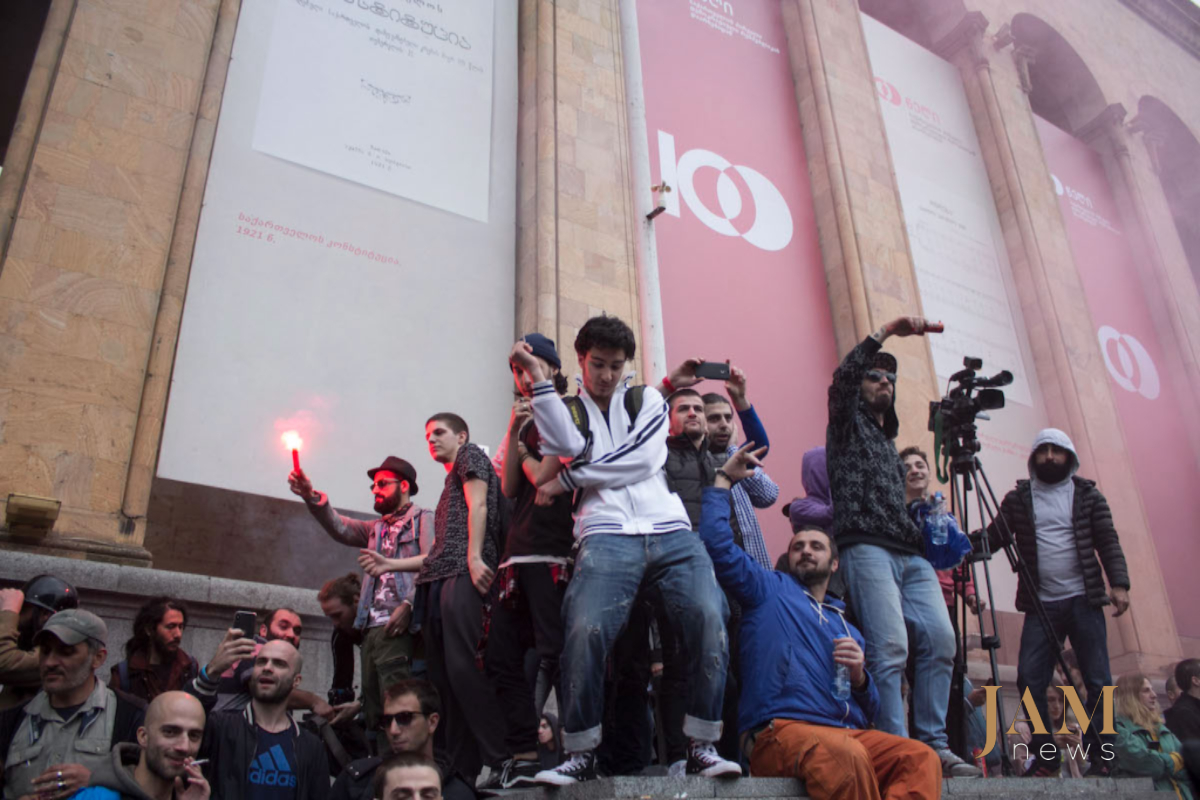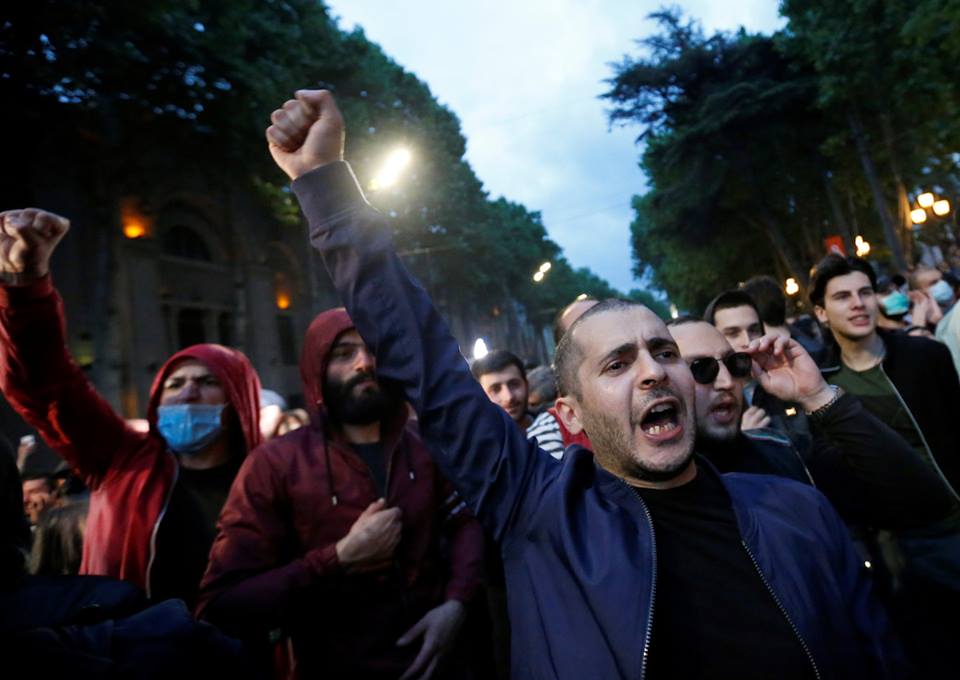Op-ed: Georgia - a war of worlds
A year has passed since the two-day ‘rave revolution’ in Tbilisi – a youth protest which took the slogan ‘We dance together, we fight together.’
On May 13, a counter-demonstration began of ultranationalist groups demanding that the authorities disperse the rally and threatened to attack protesters.
The rally ended after Interior Minister Giorgi Gakharia met with the leaders of the rally. Then he went out to the protesters, apologized to them and promised to begin work on legislative changes to the country’s drug policies.
The two-day protests against a police raid on Tbilisi’s night clubs has unveiled a number of problems that go far beyond Georgia’s narcotics policy, human rights and police abuse.
On 14 May,2018 two Georgias came up against one another on Rustaveli Avenue – two groups that are radically different from one another in how they see Georgia’s future.
Participants of the youth protest were threatened and surrounded on all sides by another group of young people who called themselves nationalists and who did not hide their intentions to ‘deal’ with those gathered in front of the parliament building, calling them ‘liberasts and pederasts’ (the term ‘liberasts’ is wordplay combining the words ‘liberal’ and ‘pederast’).
The aggressive group periodically tried to get through the police cordons. Eventually the protesters who were in front of the parliament building were taken away in buses after negotiations with the head of the Ministry of Internal Affairs were concluded.
Who was against who?
• Commentary: All Georgia needs is a cultural revolution
• Police simultaneously raid three nightclubs in Tbilisi
One may get the impression that the public did not understand who was protesting and demonstrating, nor for what.
Many thought that the aim of the protest was to ‘defend the drug dealers’ who were arrested by the police and to legalise narcotics. However, the main thrust behind the protest was, as protesters said, the unfair use of violence and the violation of the rights of clubbers during the police raid on the nightclubs.
The negative attitude towards the protesters was fueled by videos published on social media that displayed strangely-dressed, ‘alternative’ people.
However, it is worth remembering that for the most part, those who regularly go to nightclubs in Tbilisi are not ‘druggies’. A large percentage of them are regular, young people, on average under the age of 30 with careers and even, sometimes, a western education – bankers, managers and state servants – Georgia’s recently-born middle class.
These are people that know several languages, who have seen the world and are in-demand in their areas of expertise. For them, to go to a club after a long work-week is one of the best ways of unwinding and spending their time.
For this group of people, the police’s ‘intrusion’ on the nightclubs was viewed as a real ‘apocalypse’. The Georgian middle class, which is generally apolitical, did not take the intrusion into their personal space lightly – a space where it had hid from politics and from the surrounding reality. But in the end, they were unable to do so.
On the other side of the barricades, there were representatives of several right-wing groups which one hears little about – ‘Black-shirts’, some ‘Regiment’, some ‘Civil Guard’ and other similar groups – akin to what one heard of back in the beginning of the 1990s.
The opposition and protesters claim that these groups are controlled by the government – maybe so, maybe not. However, that’s not important. What is important is how the representatives of these camps react to one another.
From the point of view of those who did not support the protests in front of parliament, the protestors are representatives of some invasive, non-native culture that does not respect Georgian traditions and values. They dress different and look and act differently; in a way one simply shouldn’t. And if they aren’t punished, the right-wingers seem to believe, Georgia will collapse under their pernicious influence.
For many protestors it was a complete surprise and discovery to find out that apart from the ‘creative class’ there is another category of youth that has not been as lucky when it comes to education and the atmosphere in which they grew up. They have received their world-view from the priests of the church, many of whom say that the west is bringing only evil and perversion to Georgia and that the real, true brother of the nation is Russia.
Many of them have never been to a club, but they believe that only ‘druggies’ and ‘fags’ – as they say – hang out there. And they hate those that are different from them (their puppeteers are of course careful not to have their anger directed against Russia or the Kremlin, and little negativity is heard from them about these actors).
As a whole, ‘clubbing’ Georgia has uncovered a new side of Georgian society which hates ‘liberasts’ and is ready to have it out with them. I think that such people are more commonly found among people with low-qualifying jobs or the unemployed. So there is also a social aspect to this confrontation.


Georgian society is, perhaps, more pro-Western than other countries of the former USSR (excluding Baltic countries), even if it doesn’t know it itself. People are used to the fact that there is more or less a free media environment. They’ve gotten used to elections where the result is not known beforehand.
They are used to the fact that they can loudly express their opinion and fight for it through demonstrations and protests without fear of retaliation or of ending up stuffed into a police bus.
The former authorities in 2004-2012 taught citizens to recognize corruption and crime; they taught them to respect the law, more or less. But, apparently, there was not enough time to vaccinate citizens against intolerance and impatience.
Apparently, the strong push for the westernization of Georgia against the backdrop of a still-strong totalitarian mindset was unable to withstand the prospect of ending in conflict.
As 14 May showed clearly, the Soviet-minded masses of Georgia which are narrow-minded when it comes to all this is different from and not understood by them, and is a serious threat to the progress achieved in Georgia in the post-Soviet years.
Moreover, the conflict has a clear geopolitical dimension as well – the westernized Georgian middle-class cannot fathom the possibility of having relations with Russia. They don’t go there, they don’t know Russian nor do they want to. Their friends and classmates are in Europe and the US, not in Russia.
On the other hand, those that don’t have an education, including the youth that have been unable to ‘realize themselves’ [a term used in Georgian and Russian meaning to reach your potential -ed], are easy targets for ‘conservative’ propagandists who push for a return into the embrace of an ‘older brother’.
I cannot recall such polarisation and mental divide within the same generation in Georgia; not even when they were shooting at each other and beating up those that did not look the same or who dressed differently in the 1990s. Everyone had grown up in the same environment, simply with different views.
Now we have a ‘war of the worlds’ which exists in the same location but up until now have not come into contact with one another. There is no such situation in any other post-Soviet country.


















